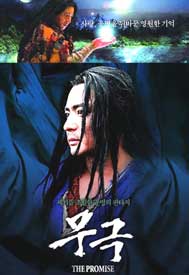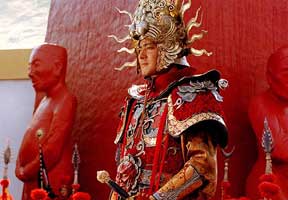 A few critics have deplored The Promise (Wu ji, 2005) sometimes even expressing a bit of glee that some test audiences laughed their arses off at the serious parts. So I'm going to stand out here in the minority asserting that it is a wonder-filled, emotionally harrowing, aesthetically winning fantasy.
A few critics have deplored The Promise (Wu ji, 2005) sometimes even expressing a bit of glee that some test audiences laughed their arses off at the serious parts. So I'm going to stand out here in the minority asserting that it is a wonder-filled, emotionally harrowing, aesthetically winning fantasy.
A few things are intentionaly comical, like the "thumbs up!" back-scratcher military staff used by the feather-boaed villain as a totally absurd weapon. That The Promise has won laughter from a few audiences even where the joke wasn't intentional is likely because the film lacks the usual cliches of wuxia & requires a fresh understanding.
Otherwise the same audiences would have to be laughing their arses off at "regular" wuxia. I mean, the usual cliches of "the martial world," of having kung fu fights when there is no earthly reason in the plot to have them, of cartoon weaponry or ad hoc use of coins or leaves or beans as weapons, this should have 'em rollin' in the aisle. But it's all taken for granted as part of the genre.
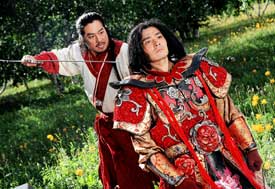 When viewers have never encountered a sublime & original fantasy framed as wuxia, the absurdities can be far fewer but stand out due to their novelty. When viewers have never encountered a sublime & original fantasy framed as wuxia, the absurdities can be far fewer but stand out due to their novelty.
The first ten minutes I would say is the most beautiful bit of cinema I've seen in a couple years. A starving little girl, Quingcheng, scavenging on the field of the dead removes a bun from a corpse's hand. She almost eats it, but then thinks better of it, saving the bun.
As she runs off, she is soon captured in a trap, strung up by her heels. A small boy in mismatched bits of oversized armor informs her the bean bun was his father's & "Now that my father is dead, the bean bun is mine."
Even so, he offers to give her the bun if she will promise to be his slave. She promises, but once she has the bun & is let loose from the trap, she wacks him on the head & runs away.
She is fleeing home to her mother to give her the bun, knowing her mother is ill & needs nourishment. While leaping across a lake from floating log to stone, she drops the bun, then sits on a log halfway across the lake weeping.
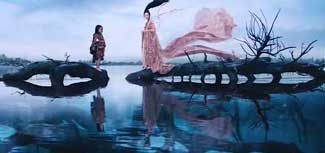 The fairytale beauty of every second of this adventure already seemed somehow a thing of magic. The fairytale beauty of every second of this adventure already seemed somehow a thing of magic.
So it was only slightly startling when Manshen the Goddess of Destinies (Hong Cheng) rose from the depth of the clear water restoring the bun to her, but telling her she must eat it herself, as her mother is already dead.
The conversation between goddess & child is remarkable. The goddess promises the child she will grow up to be admired by all men, to know only luxury. But in exchange for being worshipped for her beauty, joy will always be fleeting, for any man she cares for deeply will die.
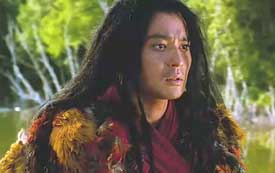 She is warned that should she accept these terms, nothing can reverse her destiny unless time runs backwards, snow falls in spring, & the dead return to life. The child eagerly accepts the bargain. She is warned that should she accept these terms, nothing can reverse her destiny unless time runs backwards, snow falls in spring, & the dead return to life. The child eagerly accepts the bargain.
This part of the film is simply breathtaking. The child performers are so good, it was almost a shame that the story moves to some years later & we won't see those little actors again.
The boy who was lied to by the girl grows up to be a fiendish conqueror, the Duke of the North, played by Nicholas Tse. The direction of his life had changed with that broken promise on the field of the dead, so that he never again trusted humanity nor expressed mercy.
Qingcheng matures into a ravishing beauty (Cecilia Cheung) who has everything she could ever desire, except love, from an Emperor.
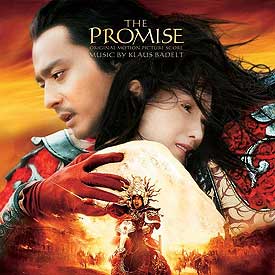 There follows a long sequence, with the herds of slaves & bulls, which is absolutely mesmerizing. There follows a long sequence, with the herds of slaves & bulls, which is absolutely mesmerizing.
By the time it settles down into a tale driven by its love-story element, it becomes a bit too much like one of those Fantasy Harlequins, spoiling any chance of it being a classic, but still well above the average Chinese adventure or fantasy film usually seen nowadays.
The story takes place in a non-specific magical time when gods & men dwelt side by side. Slaves are not taught to stand, & a slave-herder is moving his stock on their hands & knees.
They are sold to the Master of the Crimson Armor (the wonderful Japanese actor Hiroyuki Sanada, who learned Mandarin for this role). This military general has them enter the valley en masse to be sacrified against an enemies herd of vicious, stampeding aurox bulls.
The slave Kunlun (Dong-kun Jang) moves with supernatural swiftness though always on his hands & knees. When he realizes his fellow slaves, including the slave herder, are about to be killed by the bulls. faithfully grabs the herder to carry on his back, & runs ahead of the bulls.
He manages to "lead" the bulls in a broad circle, back the way they came, the enemy becoming routed by their own trick. Along the way, Kunlun learns to run upright for extra speed.
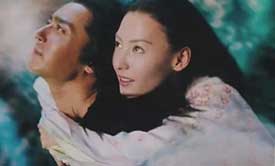 General Guangming, the Master of the Crimson Armor, has watched this amazing slave who tried so hard to save his master & ran tirelessly at a speed swifter than beasts. He makes the slave his messenger, as his fleetfootedness makes him the best private messenger. General Guangming, the Master of the Crimson Armor, has watched this amazing slave who tried so hard to save his master & ran tirelessly at a speed swifter than beasts. He makes the slave his messenger, as his fleetfootedness makes him the best private messenger.
Kunlun, an orphan from the land of snow, does not know his origins. But Wuhuan the Duke of the North has a ghostly pale assassin who moves with similar swiftness, & he knows who Kunlun is.
The assassin is Snow Wolf (Ye Liu). He steals every scene he is in, a deathlike figure of suffering & doom clad in a black peacock feather cloak that he dares never remove, or he will vanish into mist.
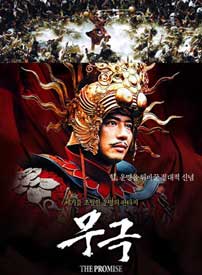 It's a film full of beautiful images, settings, & scenes. The "Princess kite" scene when Qingcheng in a feathered robe is drawn through the sky on a string is romantic & awesome. It's a film full of beautiful images, settings, & scenes. The "Princess kite" scene when Qingcheng in a feathered robe is drawn through the sky on a string is romantic & awesome.
The film also has a stunning musical soundtrack composed in an old-fashioned Romanticist mode by Klaus Badelt. And cinematrapher Peter Pau is the chap who photographed Crouching Tiger, Hidden Dragon (2000).
The tale that progresses tells of the slave who killed an Emperor (Anthony Wong) & fell in love with a princess while wearing his master's armor; of her mistaking him for the real Master of the Crimson Armor whom she in consequence becomes involved with but strives to remain aloof since death comes for anyone she loves; & of the temporary idyll they achieve.
It shows additionally the grand & numerous battles & duels against the evil Duke of the North; of Kunlun's faithful service to the Master of the Crimson Armor; of Snow Wolf the eerie assassin reclaiming his courage & humanity no matter that it cost him his life . . .
This is great stuff usually only found in big epic heroic fantasy novels, rarely making it to the screen unspoilt.
copyright © by Paghat the Ratgirl
|
